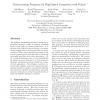Free Online Productivity Tools
i2Speak
i2Symbol
i2OCR
iTex2Img
iWeb2Print
iWeb2Shot
i2Type
iPdf2Split
iPdf2Merge
i2Bopomofo
i2Arabic
i2Style
i2Image
i2PDF
iLatex2Rtf
Sci2ools
106
click to vote
ICPP
1996
IEEE
1996
IEEE
Restructuring Programs for High-Speed Computers with Polaris
The ability to automatically parallelize standard programming languages results in program portability across a wide range of machine architectures. It is the goal of the Polaris project to develop a new parallelizing compiler that overcomes limitations of current compilers. While current parallelizing compilers may succeed on small kernels, they often fail to extract any meaningful parallelism from whole applications. After a study of application codes, it was concluded that by adding a few new techniques to current compilers, automatic parallelization becomes feasible for a range of whole applications. The techniques needed are interprocedural analysis, scalar and array privatization, symbolic dependence analysis, and advanced induction and reduction recognition and elimination, along with run-time techniques to permit the parallelization of loops with unknown dependence relations.
Current Compilers | Current Parallelizing Compilers | Distributed And Parallel Computing | ICPP 1996 | Parallelizing Compilers |
| Added | 07 Aug 2010 |
| Updated | 07 Aug 2010 |
| Type | Conference |
| Year | 1996 |
| Where | ICPP |
| Authors | William Blume, Rudolf Eigenmann, Keith Faigin, John Grout, Jaejin Lee, Thomas Lawrence, Jay Hoeflinger, David A. Padua, Yunheung Paek, Paul Petersen, William M. Pottenger, Lawrence Rauchwerger, Peng Tu, Stephen Weatherford |
Comments (0)

